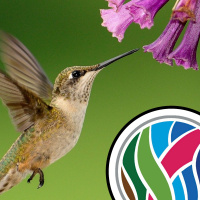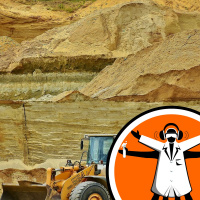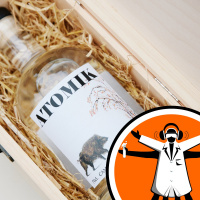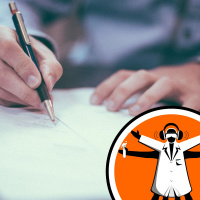Naked Scientists Special Editions Podcast
- Autor: Vários
- Narrador: Vários
- Editora: Podcast
- Duração: 169:07:13
- Mais informações
Informações:
Sinopse
Probing the weird, wacky and spectacular, the Naked Scientists Special Editions are special one-off scientific reports, investigations and interviews on cutting-edge topics by the Naked Scientists team.
Episódios
-
Motherless gorillas and how hummingbirds hum
28/05/2021 Duração: 27minThis month: how hummingbirds hum, how elephants evolved anti-cancer genes so they can sustain big bodies, gorillas that grow up without their mothers, and why deforestation causes peaks and then troughs in malaria cases... Like this podcast? Please help us by supporting the Naked Scientists
-
New process may transform mining
27/05/2021 Duração: 04minFor thousands of years, humans have used traditional mining techniques involving sinking tunnels or large pits to recover relatively small amounts of useful metals like gold and copper. What remains is usually, at best, a scar on the landscape, large amounts of waste material, and habitat destruction. At worst, the practices have led to environmental catastrophes. Now an international team, including researchers from the University of Western Australia, have found a way to harness the power of electricity to achieve the same mineral recovery but without the environmental costs. By placing... Like this podcast? Please help us by supporting the Naked Scientists
-
Vodka from Chernobyl on its way to UK
19/05/2021 Duração: 05minIf you live in the UK, you should soon be able to drink vodka... from Chernobyl! Which might sound like a radioactive nightmare, but the stuff is - supposedly - completely safe to drink. Not only do radioactive particles get removed during the distillation process, there were few originally there at all - thanks to how well much of the environment around Chernobyl has recovered since the 1986 disaster. The project is the brainchild of researchers in Ukraine alongside environmental scientist Jim Smith from Portsmouth University. They've just distilled the first batch of their vodka, but... Like this podcast? Please help us by supporting the Naked Scientists
-
Loan applications rejected more around midday
14/05/2021 Duração: 04minIt's often hardest to think when you've been working all day - especially if your job involves making lots of decisions. Psychologists call this decision fatigue. And evidence has shown that the phenomenon has serious, real-world consequences... beyond making you collapse on the sofa. Now, a study from the University of Cambridge seems to demonstrate that it could make the difference between your bank loan getting approved - or rejected. Lead author Tobias Baer spoke to Eva Higginbotham... Like this podcast? Please help us by supporting the Naked Scientists
-
Camera based on shrimp eye sees cancer cells
13/05/2021 Duração: 03minThe mantis shrimp is a sea creature with a particular party piece. While our eyes are sensitive to three colours, red, green and blue, which our brain uses to make the full rainbow of colours we see, the mantis shrimp is sensitive to 12 to 16 different colours, giving them a much wider spectrum of colours. Scientists in the University of Illinois figured this might be useful, and have created a camera that can see colours we can't. The idea is that if you tag a cancerous tumour with a fluorescent chemical that we can't see, but the camera can, it will give surgeons a quick and easy way to... Like this podcast? Please help us by supporting the Naked Scientists
-
SciHub: are they stealing your data?
10/05/2021 Duração: 06minAlexandra Elbakyan is the founder of the website SciHub, and it came out this week that she is being investigated by the FBI. You see, SciHub is an illegal venture: it makes research papers available for free to people who want them, bypassing the fees and subscriptions that journals would normally charge for that access. In this respect they can claim the moral high ground: people who couldn't otherwise afford to access the material can read it. But the way SciHub obtains the journal articles it makes available is not legal; they are said to have obtained access codes from people at... Like this podcast? Please help us by supporting the Naked Scientists
-
Plants affected by noise pollution
30/04/2021 Duração: 03minNoise pollution can be difficult to live with, and it turns out that plants are also impacted by too much noise, although not in the way you might expect. Jenny Phillips from Texas A&M in San Antonio has been studying the seedlings of native trees around gas wells in New Mexico. She's found that noise pollution can drive away the animals that some plants rely on to spread their seeds, as she explained to Katie Haylor... Like this podcast? Please help us by supporting the Naked Scientists
-
Biological target for future anorexia drugs
28/04/2021 Duração: 07minAnorexia nervosa is a cruel, complex and serious mental health condition. It involves deliberately losing weight in order to keep body weight as low as possible. And through investigating brain circuits involved in regulating body weight and which can go awry in obesity, Roger Cone from the University of Michigan and colleagues, along with scientists from Vanderbilt University, have now shown that activating a particular receptor called MC3 in the brains of mice encourages them to eat more, whilst at the same time also suppressing fear and anxiety. And Roger thinks this has interesting... Like this podcast? Please help us by supporting the Naked Scientists
-
Ancient DNA extracted from cave dirt
26/04/2021 Duração: 05minWhen they're trying to piece together our understanding of ancient Humans and Neanderthals, scientists often have to rely on artifacts found in caves. What scientists wish they had more of was ancient DNA, which would allow them to study how the populations of these groups changed and expanded over time. Now that's about to change thanks to Benjamin Vernot at the Max Planck Institute, as he explained to Eva Higginbotham.... Like this podcast? Please help us by supporting the Naked Scientists
-
New treatment for paracetamol overdose
20/04/2021 Duração: 05minEach year 80,000 patients are hospitalised in the US for paracetamol overdose, the leading cause of liver damage in the US and Europe. The current treatment is effective at treating the liver damage, but because its efficacy is limited to being given within 8 hours since the overdose, scientists have been looking for alternative treatments. Melanie Jans-Singh spoke with clinical scientist Christof Gaunt, about the discovery of a new molecule that can treat the damage done by the paracetamol overdose to the liver... Like this podcast? Please help us by supporting the Naked Scientists
-
Masks on the beach and in beer gardens? C'mon...
16/04/2021 Duração: 03minFace masks have their place, but what's really needed right now is a breath of fresh air and a dose of common sense to control Covid-19, as Chris Smith explains... Like this podcast? Please help us by supporting the Naked Scientists
-
Genetics behind why rabbits hop
12/04/2021 Duração: 04minNew research has found a gene that looks to be the reason why rabbits, and perhaps all bouncing mammals hop. Using an unusual type of rabbit, called a sauteur d'Alfort, which doesn't hop, but runs on its front paws like a handstand, scientists have found a specific gene called RORB, that's missing in these rabbits. Defects in this gene may have damaging effects in all mammals though, not just rabbits. Adam Murphy spoke to Leif Andersson from Uppsala University about these bizarre bunnies... Like this podcast? Please help us by supporting the Naked Scientists
-
Spinosaurus: was it a giant, toothy heron?
09/04/2021 Duração: 04minSpinosaurus was a dinosaur that was around 13 metres long, and looked a little like a T-Rex with the addition of a massive sail on its back. There's been much debate around how it lived; while it seems to be tied to the water, it's unclear how close those ties were. One theory suggests it was actually like a crocodile, living a pretty aquatic life. But new research points to features of its anatomy that suggest that it was a lot more like a giant, very toothy heron, waiting at the water's edge. Adam Murphy spoke to David Hone from Queen Mary University of London about the dino debate... Like this podcast? Please help us by supporting the Naked Scientists
-
The world of fungi inside seed banks
08/04/2021 Duração: 05minWe share our planet with microbes. Some do us harm, others do us good and are known as our microbiome. Plants also have a microbiome, and in a paper out recently, scientists working in a seed bank report how they got curious about what microbes could be stored away inside banked seeds. And by surveying seeds from just 1 type of plant, they found about 200 species of fungi. Katie Haylor spoke to study author Rowena Hill... Like this podcast? Please help us by supporting the Naked Scientists
-
Eagle killer identified
02/04/2021 Duração: 06minIn 1994, at DeGray Lake in the state of Arkansas in the USA, 29 bald eagles were found dead from a mysterious disease. Many more across the area have been found suffering from "Avian Vacuolar Myelinopathy", which causes holes in the brain and spinal cord, and erratic behaviour. Researchers now think they've cracked the mystery, as Eva Higginbotham heard from Timo Niedermeyer at Martin Luther University in Halle, Germany... Like this podcast? Please help us by supporting the Naked Scientists
-
Industrial yeast impairs gut wound healing
01/04/2021 Duração: 06minCrohn's Disease is a type of inflammatory bowel disease (or IBD), where the immune system attacks and inflames bits of the intestines. It can cause diarrhea, pain, fatigue, and consequent disruptions to daily activities like school and work. There are treatments, but currently no cure. Now, scientists in the US have found that a fungus used industrially in foods like wine, cheese and cured meats - called Debaryomyces Hansenii - seems to be thriving in gut wounds in mice, and getting in the way of the wounds healing. And they think a similar thing is happening in the inflamed intestines of the... Like this podcast? Please help us by supporting the Naked Scientists
-
Wildfire smoke detected in stratosphere
31/03/2021 Duração: 05minFires of any scale tend to produce a certain amount of smoke - a variety of different particles including small bits of unburnt fuel, which eventually disperse into the atmosphere. And looking at data from satellites out in space, scientists in Israel have shown that smoke from the late 2019 / early 2020 Australian wildfires actually travelled up beyond the lower atmosphere (known as the troposphere) and into the stratosphere - that's above where clouds gather and planes tend to fly. Up here, these smoke particles stick around for longer, where they can absorb or scatter incoming energy from... Like this podcast? Please help us by supporting the Naked Scientists
-
Cone snails seduce prey with pheromones
17/03/2021 Duração: 05minCone snails are a group of highly venomous marine snails. Their shells are beautiful, but they pack a powerful neurotoxic punch: some members of this family are so poisonous that they can easily kill a person. But one species of cone snail, called Conus imperialis, produces a very different reaction in the worms they hunt. This snail has a venom cocktail that includes pheromones: it uses similar chemicals to the ones the worms give off when mating. Why make a worm aphrodisiac? Phil Sansom spoke to Joshua Torres from the University of Copenhagen about these strange creatures... Like this podcast? Please help us by supporting the Naked Scientists
-
Modelling concussion with eggs
04/03/2021 Duração: 04minIn recent years we've realised quite how bad a knock on the head can be for us, because the brain bobs about suspended in fluid inside our skulls. And if you move, or stop, the head suddenly, the brain cannons into the inside of the skull and can be injured. It's especially important in sports, but it's hard to study - and to develop effective safety equipment - for obvious reasons. But scientists have now discovered that something you commonly find in fridge door behaves in an uncannily similar way to your brain. Adam Murphy found out more... Like this podcast? Please help us by supporting the Naked Scientists
-
Diabetes drug trialled to treat obesity
03/03/2021 Duração: 05minIn the UK, about 1 in 4 adults are affected by obesity, which is linked to diabetes, heart disease and some cancers. But recently a new study has documented the effect of giving a drug called semaglutide to 2000 people over a 1 year period. The drug mimics a gut hormone called GLP-1 to boost insulin levels and it's already used to treat diabetes. The study subjects lost an average of 15kg on the drug, suggesting that it might be an effective way to support weight loss. Katie Haylor asked Cambridge University geneticist and obesity specialist Giles Yeo to take her through the results of the... Like this podcast? Please help us by supporting the Naked Scientists

































